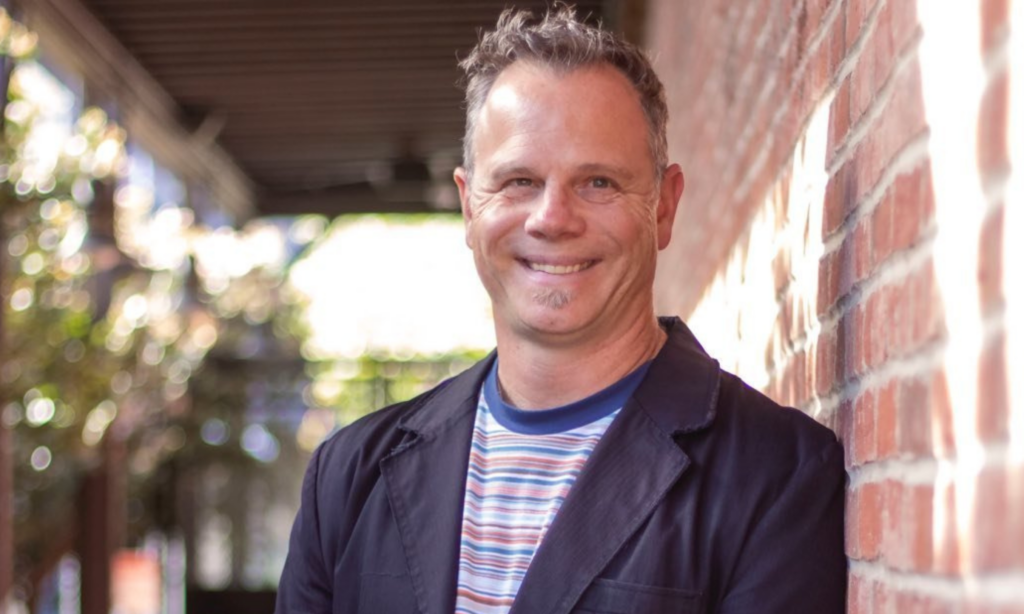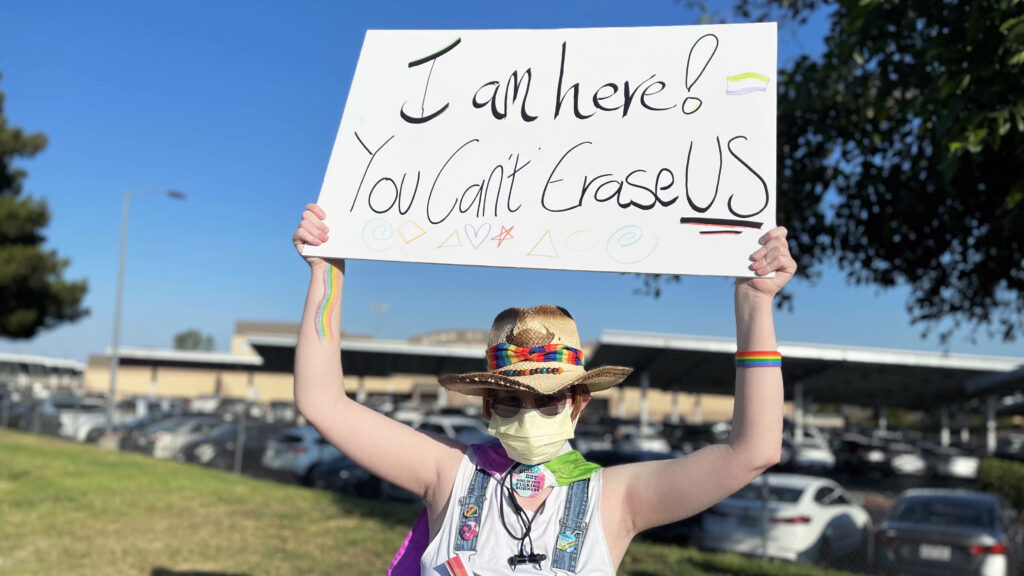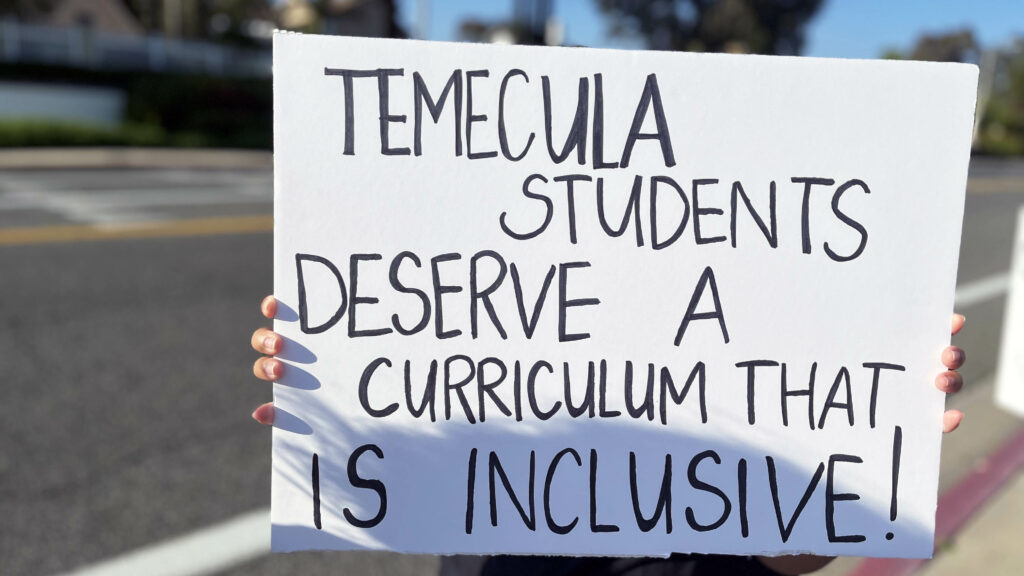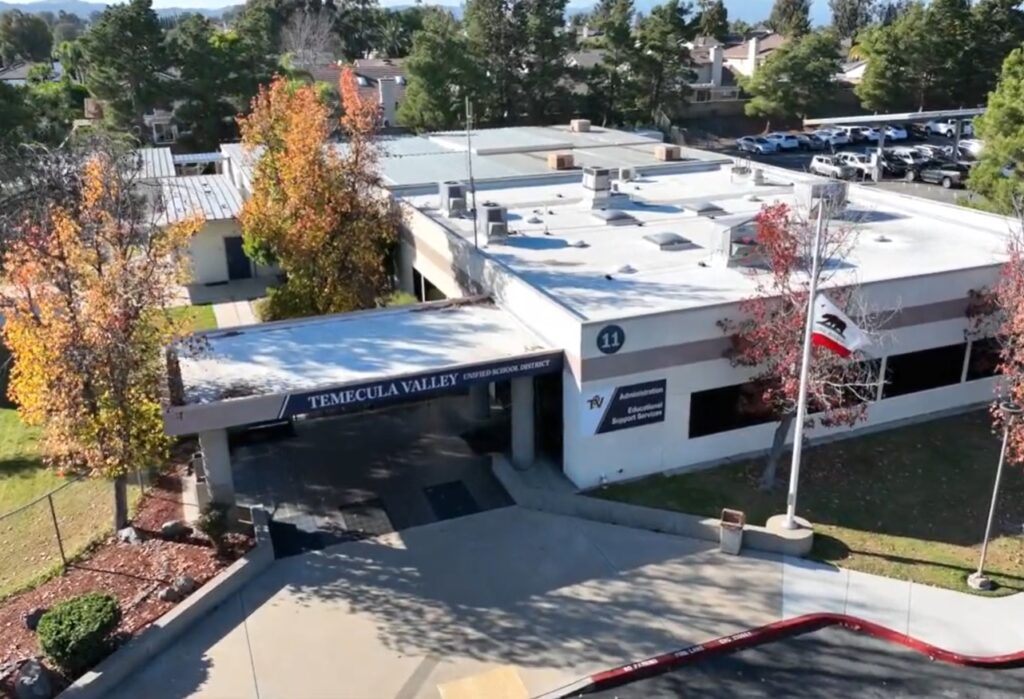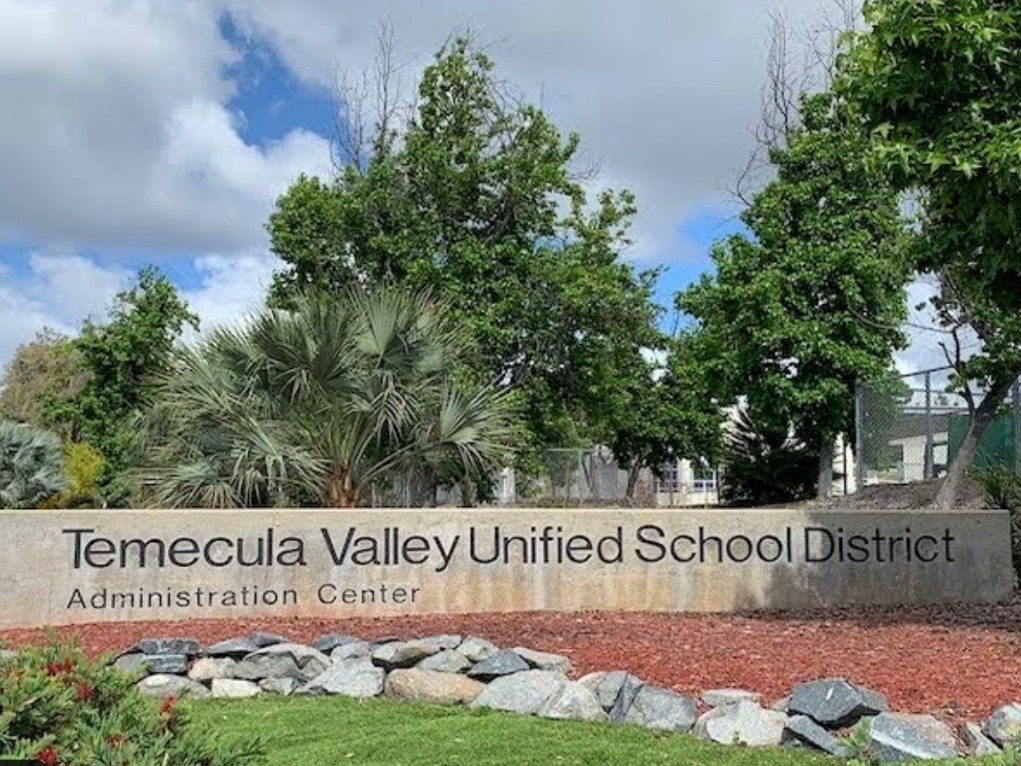
Credit: Alison Yin/EdSource
May 12 began as a typical school day for Temecula Valley High School drama teacher Greg Bailey.
But when he opened his mailbox, he found a printed copy of an email, sent on May 7, complaining that he taught the Pulitzer Prize-winning play “Angels in America” by Tony Kushner, which deals with the AIDS epidemic in New York during the 1980s.
Allegations mounted that Bailey was grooming students and that he forced them to perform a short, explicit scene involving a gay man who makes questionable choices while dealing with the pain of his partner who was dying of AIDS.
Two days later, he was called to the principal’s office at Temecula Valley High School, and about 48 hours after that meeting, he was pulled out of the classroom and placed on paid leave, leaving his students in the hands of a long-term sub and the theater department that he runs in limbo.
“Most kids who take Drama 1, that’s the only drama class they will ever take in high school, and my whole goal is to bring in the most important, most talked-about plays,” Bailey said during an August interview.
“I tell them that it is about the AIDS crisis in the ‘80s in New York, that it contains adult language, that it has graphic situations in it. And it’s clear from the very first day of class in the fall semester that if students are uncomfortable with anything in the material or the way that anyone talks about them, that they just need to come to me, and we’ll make them comfortable because being comfortable in drama class is really, really important.”
While Bailey has since returned to the classroom awaiting potential discipline, his three-month-plus suspension has had a chilling effect on district teachers, many of whom are having to censor course materials, compromising student learning, for the sake of keeping their jobs.
Edgar Diaz, president of the Temecula Valley Educators Association, the district’s teachers union, said teachers sometimes feel like they have “36 eyes, 36 cameras” focused on them at any given moment — a situation some say has been challenging, especially since the school board banned critical race theory, temporarily removed the Social Studies Alive! curriculum over a mention of LGBTQ+ activist Harvey Milk and passed measures that would require school officials to notify parents if their child shows signs of being transgender.
“You just never know what someone else takes as the main focus of what you’re trying to say in a lesson or side conversation, or take something out of context,” Diaz said, adding that teachers fear they’ll be accused of violating the state’s education laws and losing their teaching credentials. “If your credential comes under fire, then you’re no longer able to carry out work anywhere in the state. And that’s a scary thing.”
The Temecula Valley Unified School District did not respond to EdSource’s requests for comment in response to Bailey’s story or to the allegations raised by teachers.
In the theater
Bailey, who has taught in the district for five years, often incorporates a unit focused on American playwrights.
At the start of the unit, he briefly introduces and summarizes 10 plays, and students pick one of them to study in groups. “Angels in America” was listed as one of the 10 options.
During the unit, students are also asked to complete a project that can involve performing a monologue or a scene, or they can bypass performance altogether and focus instead on set or costume design. Even if a student wanted to perform an explicit scene, Bailey said he would not permit it.
“I’m not against safeguarding or protecting the students,” Bailey said. “And if there are safeguards that need to be in place that I was somehow, you know, unaware of not putting in place, I’m willing to do what is right to make my students and their parents feel safe in my class. But that’s not the discussion that’s being had.”
Rather, Bailey — who has denied all allegations — said he feels like he’s being used as a “pawn in a much bigger political game,” and he anticipates other teachers will face similar accusations.
He said he’s still concerned about the larger effects on students’ education.
“If they’re going to fire me, I hope that they choose to do it soon so they can hire someone else, so that my students have a teacher and they have some kind of direction for their future of the program,” Bailey said.
Off stage
Temecula teachers have had to adjust the content of the lessons they teach and how they teach them, from taking down posters of Black activists, veering away from discussing current events and even removing classroom libraries.
“What happened to Mr. Bailey was scary for all of us,” said Jennee Scharf, a high school English teacher and department chair. “So I think that some teachers are even more cautious after that situation. So even if I tell them ‘It’s OK, it’s board approved,’ I don’t know that it’s always really believed 100%.”
Although the department’s curriculum already includes George Orwell’s “1984,” Scharf said they want to teach the graphic novel version and are worried about getting it approved by the board.
Teachers have also been apprehensive about asking for more copies of “The Immortal Life of Henrietta Lacks,” as some parents in the district have characterized as pornographic a scene in the book where the main character examines herself and realizes she has cervical cancer.
In addition to being concerned about what pieces of literature they can teach, teachers like Scharf are having to change their approach to books that have already been approved, such as Bryan Stevenson’s “Just Mercy.”
“‘Just Mercy’ is … not just about the systemic racism, but systemic failures throughout or isms — ableism, sexism — throughout the justice system, and I might be a little more hesitant to point that out and have to really hope that the students can pick up on that on their own,” Scharf said.
Now, she avoids questions that make her students think critically about systemic injustices the book addresses.
“If I’m not even allowed to suggest that (these injustices) might be happening, how can the kids get to the part where we will come up with solutions for preventing these things in the future?” Scharf said.
Several teachers — including Margarita Middle School English teacher and activities adviser Rafael Loza — said they routinely send notices to parents if there is anything that might be sensitive about a piece of literature they’re teaching.
For example, whenever Loza teaches “Lord of the Flies,” he informs parents of the violent scenes and tells them that if they are uncomfortable with the material, he can have their child sit out of the class discussion or complete an alternate assignment.
He feels removing the book from the shelf altogether, however, should not be an option.
“The majority of my kids are going to, you know, partake in our discussion, our Socratic seminars in class. … I’m not going take away that aspect of critical thinking because I have one or two parents that … don’t want them to do that for whatever reason,” Loza said.
“Teachers call their students ‘my kids’ because of the bond and the trust that we build with those students. And it’s sad that the actions of three (school board members) with political motivations have undermined that trust.”
‘Censorship always fails’: A broader picture
In the long run, “censorship always fails,” according to Brent Blair, a professor at USC’s School of Dramatic Arts.
“As one of the richest countries in the world, we’re living in one of the greatest impoverishments of our cultural imagination in our history, where people can’t see metaphor, or they can’t imagine any kind of message … ‘Angels in America’ is sexual violence? That’s staggering to me,” Blair said.
He added that for those who are religiously conservative, “Angels in America” can also be read from a perspective of “great faith.”
“I often speak to those students who are concerned or worried about sexual content or about a general sense of some of the work that we’re doing, just to remind them what a rebel, and what an exciting, radical revolutionary Jesus was,” Blair said.
“I think if they could have a deep dive into ‘Angels in America,’ they can understand that this is also a play against sexual violence,” he said. “It’s against burying ourselves and shutting down our hearts. It’s an epic love poem to acceptance.”

